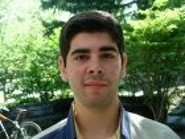
Summer didn't turn out quite as expected for Tamim Akiki '08. The native of Lebanon had planned to go home for the summer and evaluate the objectives of the central bank as part of his Levitt research on the role of a central bank in a small open economy. Then came mid-July and Akiki found himself in a war zone between Israel and Hezbollah.
Akiki's family lives in a city near Beirut, not in the heavily-bombed southern suburbs. Once the bombardment began, the city's supply of electricity was severely limited. He said that it was worse at night when the planes flew over – Akiki's area of the city was not bombed, but was kept under surveillance – and planes "sounded like they [were] landing on the roof."
Akiki, who is a second year Levitt fellow, started the summer like any of his other researching peers. He had received a Levitt Fellowship to work on a study titled "The Role of the Central Bank in a Small Economy: The Case Study of Lebanon," with Erol Balkan, the James L. Ferguson Professor of Economics, as his advisor. Akiki spent several weeks at Hamilton in June gathering the data he needed for his study. He had planned to analyze his data in Lebanon and talk to several professors at the American University of Beirut, but understandably after the middle of July the professors were unavailable.
What interests Akiki about Lebanon is that maintaining financial stability requires extensive knowledge about the economic performance of large open economies such as the U.S. and the EU. However, the financial stability of the entire banking system can be jeopardized by a few wealthy bank owners, a scenario that took place with the defaulting of Al-Madina Bank. Therefore, he hoped to "explore the various monetary policy options for a small open economy and then apply economic theory to evaluate the current objectives of the country's central bank."
Akiki focused on "the interest rate and the current peg to the dollar as the two major tools in which the central bank maintains stability and promotes growth." He concluded that "given Lebanon's major trading partners, a basket that includes both the U.S. dollar and the Euro would be advantageous in increasing competitiveness and promoting growth."
Although Akiki's research was interrupted, he did have the opportunity to see how Lebanon's economy dealt with the economic shocks of war and large cash infusions, donations provided by Saudi Arabia and Kuwait to keep Lebanon's economy afloat. He said that the central bank had enough dollar reserves to maintain its dollar peg even without the large deposits that Arab countries provided. He also criticized these countries for making their deposits in dollars instead of the Lebanese pound.
Akiki left the country in late August and flew to the U.S. from Syria. He said that he lost half of his luggage, probably at Heathrow, but that crossing the border into Syria was quite simple and did not require much paper work or security clearances.
A rising junior, Akiki plans to continue his study of the Lebanese economy and possibly to pursue a senior thesis on Lebanese interest rates. He noted that he still had some work to do on this summer's section of his project, but he still hopes to follow his original plan. He will be on the New York City program spring semester.
The grant which funded his work was the Levitt Research Fellowship, given by the Arthur Levitt Public Affairs Center. This grant is intended to fund research in a public affairs issue and allows a student to spend 10 weeks working closely with a faculty advisor.
-- Lisbeth Redfield
Posted September 18, 2006
